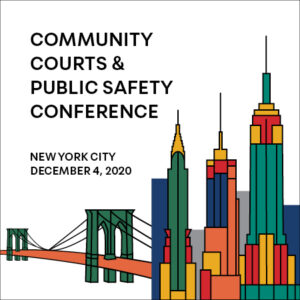If we are going to transform the criminal justice system, if we are going to make it better in any shape, form, or fashion, it really requires boldness. – Khalil A. Cumberbatch, Council on Criminal Justice

At the end of a year that laid bare the connection between public health, public safety, and social and economic justice, the Center for Court Innovation hosted its biennial community justice conference. With support from the Department of Justice’s Bureau of Justice Assistance, this one-day virtual conference convened an audience of 500 judges, attorneys, researchers, social service providers, law enforcement officials, and more from across 32 states and five countries to discuss today’s most pressing justice reform issues.
The conference was inseparably intertwined with and impacted by the events of the year just coming to a close. A devastating global public health pandemic, a polarizing national election, an economic crisis, and a racial justice reckoning that has reacquainted millions of people with the pervasiveness of racism in American life today all worked together to raise fundamental questions. What is the proper relationship between community and justice? Can we be safe if our communities are not healthy? Do we uphold separate, unequal justice systems?
Weaving together strategies, lessons, and values that can enable justice-system practitioners to approach old challenges with renewed boldness, speakers streamed in from Texas, Alabama, Washington, Nevada, New Jersey, California, and elsewhere.
Along with major disruptions in the daily operations of courts across the country, the pandemic has also forced jurisdictions to accept drastically different realities, in many places prompting, at least initially, a steep decrease in jail populations. The improved use of technology to increase access to justice also seemed unlikely a short time ago. With so many traditional features of the justice system disrupted, the appetite for more imaginative and transformative solutions is growing.
Judge Andra Sparks of Birmingham Municipal Court, who has overseen the development and expansion of a number of problem-solving initiatives in his jurisdiction, explained the need to promote collaborative approaches to address the complicated web of social issues that can lead people to have contact with the justice system. “What we’ve discovered is that the opportunity for us to serve people requires tools that courts don’t normally have. In order for us to effectively support people, we need to bring in partners who do that every day.”
Molita Strong, program manager of Dallas’s first felony-level community court reinforced this point. “Having an agency that’s trauma-informed as part of our program has just been invaluable. So many of our participants have a much deeper story to be heard and having an agency that can really connect and understand these much deeper issues and then turn around and convey them in a community court setting, it only brings an increased sense of compassion for all of our participants.”
The theme of compassion and dignity ran across every session of the conference. Judge Alex Calabrese of the Red Hook Community Justice Center in Brooklyn, New York, noted: “Now more than ever, an open dialogue is needed to discuss how we should go forward together doing justice… Experts will see that community courts are providing better, fair, and more compassionate justice than the traditional court approach. They will see we are bringing essential services and solutions to our communities and that we care.”
Multidisciplinary collaborations within the justice system can leverage expertise and resources to humanely address pressing challenges like substance use disorders, mental illness, and homelessness.
“As much as we have historically known crime and punishment to be the way of the land…we have also learned…that public safety is really a matter of public health. And the more we focus on the health of our community, the more safe we will all be.” Yulise Reaves Waters, Deputy Director, Lone Star Justice Alliance.
But scale alone does not explain the slow pace of progress. We must acknowledge that complacency and bias have, for too long, been part of the problem. A 2018 report on the disparate treatment of Black Americans in the justice system points to the many decision points at which practitioners can begin to work in their own capacity to seed change:
Bias by decision makers at all stages of the justice process disadvantages Black people. Studies have found that they are more likely to be stopped by the police, detained pretrial, charged with more serious crimes, and sentenced more harshly than white people. Living in poor communities exposes people to risk factors for both offending and arrest, and a history of structural racism and inequality of opportunity means that black people are more likely to be living in such conditions of concentrated poverty.
In a presentation focused on building legitimacy through transformational change, speakers Dr. Larry Terry, Director of the Weldon Cooper School of Public Service, and Elizabeth Henneke, Director of the Lone Star Justice Alliance, urged practitioners to take a sober look at disparities in their jurisdictions, and issued a call to action:
“Act with a fierce urgency of now, because every day that we don’t make systemic change, every day that we make modest and incremental changes that don’t incorporate the needs of directly impacted people in the communities with which we serve, we have lost out on an opportunity to give hope and opportunity, not only to the people who we serve, but to our communities who need this legacy put behind us and who need to see the horizon come today. And so I encourage everybody to take this moment and reassess, can you do more? Can we do it faster, and can we do it better?”
Resources
- See the complete conference agenda.
- Access the supplemental materials.
Since 2010, the Center for Court Innovation and the Bureau of Justice Assistance have hosted biennial international conferences for community justice practitioners. Learn more about our previous summits.